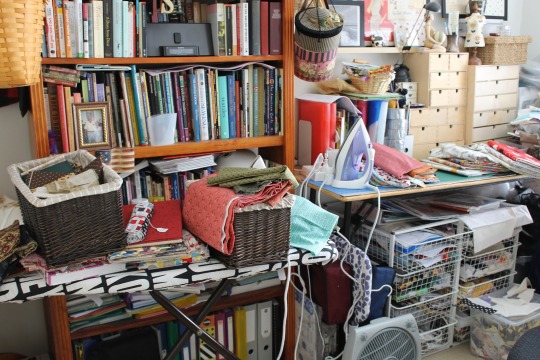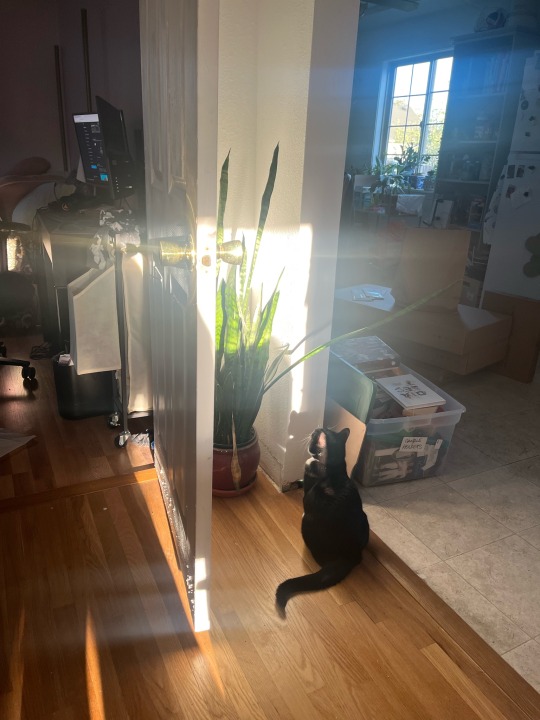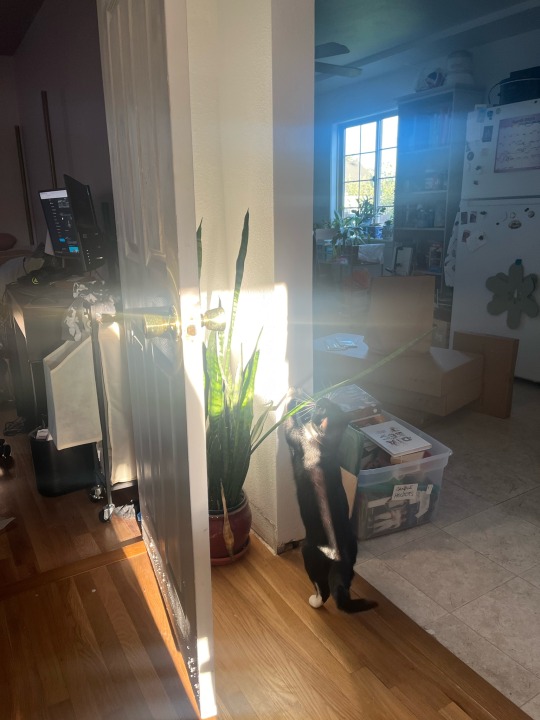Text
Also on topic of Consent: whenever somebody says "Kids should have bodily autonomy!" some guy always is like "You are too unrealistic. What will you do when a kid is seeing the doctor and doesn't want to get a shot? Would you just let them refuse the shot?"
Yeah I probably would. You're straight up asking the wrong person if you want the nice normal answer here. Doctors and nurses forcibly doing (relatively routine) things to my body against my protests when I was a small kid fucked me up so bad that as an adult anything medical related is a huge trigger for me, I've had persistent intrusive thoughts and recurring nightmares about medical procedures, and I can't have even the most basic tests and health checks done on top of it.
I hate talking about it because I can't get comfortable calling it "trauma" and I don't have any other words that are useful, but it's made my life so much harder and really scary since if I start having a weird symptom, there's nothing I can move myself to do about it.
I figured out a loophole where going to a pharmacy instead of a doctor's office for vaccines reduces some of the stress, but I was still in stress and misery for days before I went to get my tetanus shot. The repulsion is so intense it feels like I literally don't have control over myself, it feels like I can't make appointments or plans about such things out of my own free will, and so every year I have guilt guilt guilt guilt guilt about how I should get the flu shot, and it does nothing but ineffectually hurt me.
Vaccines save lives and all that, but when it comes right down to it, I don't think it's actually a net benefit to public health to give any percentage of kids lifelong psychological scars so deep and painful they're almost completely barred from accessing health care as adults.
I know I'm not the only one, far from it.
#long post#de-escalation my beloved.#i like having something to squeeze or talk about when i get a stressful or painful procedure done. not a stress ball though#stuffed toys have a nicer squish than foam imo
5K notes
·
View notes
Text
If you are watching a TV show, it can be live action or animated.
But not when you're reading a book. Much to think about.
2K notes
·
View notes
Text
i didnt know people were insecure about their eye colour until i came on this website
39K notes
·
View notes
Text
having anxiety is like being given permanent unwanted custody of a halter arabian. like okay buddy is it panic time again. cool you probably need more exercise and an apple and then maybe you'll calm down.
#Very glad that i was able to refuse vallium as quickly as i was at the psych ward. i've been working with this horse a while thanks#the antipsychotic seems to have been much more useful. especially now i'm somewhat adjusted#taking it with an antidepressant it's probably stabilising my mood pretty well
45K notes
·
View notes
Text
Transfem to Transmasc solitary must exist as much as any trans solidarity must exist.
Protect my boys.
18K notes
·
View notes
Text
Animal reference photo compilation concept test!
I've been saving this project for a new website I'm planning, but that's been delayed by the grindstone of capitalism, so I'm going to set up this part early. This is the concept test for a repository of reference photos of a whole bunch of different species of exotic animals.
For every 50 or so photos I take of an animal, there's generally only a couple that I like and are also in focus and also framed correctly. But that led me to realize... all those slightly blurry or off-center photos are probably a great set of references for people interested in general shape/form/movement for their art! So I'm setting up of the idea before fully committing the time into making it happen.
I've been going through my photo backlog and pulling out the shots I think will be useful for art references. Lots of them show posture, facial movement, close-ups of feet or eyes, and walk cycles, but also other behaviors like jumping or drinking. They're not perfect - there's often stuff out of focus or reflections on the glass - but I think they'll still be useful for art?
The link below is to the Dropbox where I'll host these photos until I eventually get that new website/project up and running. Right now I've got folders of four species uploaded for this test: California Condor (CW for carcass feed photos), Jaguar, Komodo Dragon, and Moose. Please go check them out and tell me what you think!
~~WADTT Animal Reference Photos Dropbox Link~~




What I'm looking to learn from y'all is:
Is this type of reference photo repository useful / worth doing?
Do these photos work or are they too blurry/wonky/there's too many?
What things would make a project like this better? (Caveat, it has to stay on Dropbox for now).
If this turns out to be as useful as I'm hoping, and the photos work, I've got a whole bunch more species to upload.
648 notes
·
View notes
Text
It’s extremely easy to get me into new music. Recommend me a song or two from your friends’ band. Hold on. How many of you know a band
Ok. Now post a link for me
#old acquaintance and also my dad#i will recommend neither in this space unless i have your address already because it'd dox me#musics
307 notes
·
View notes
Note
You posted about adhd and I was hoping to follow up to clarify something. I’ve explained to my partner a million times about how the borderline-hoarding mess of his space is very mentally draining to me, and he understands but we’ve both essentially accepted he won’t clean his mess because he can’t because of his adhd. You’re saying he’s actually being a shit head?
This isn't necessarily an issue of him being a shithead, but it also isn't a sustainable situation. It's not good for you and there's a level of clutter that's probably not good for him either.
Large bastard is a lot more clutter-y than I am. The solution we've come to is trying to keep our messes at least isolated from one another; he can have his messes and I can have mine, but he can have those messes in his spaces, not all over the place. Sometimes those messes migrate, and that's when it's important for him to make the effort to rein them in rather than trying and failing to make a daily effort to keep our entire shared space tidy.
I think when you say "we've both essentially accepted he won't clean his mess" what I'm hearing is resignation; you're not happy about this but you don't know what to do so you've thrown up your hands and he feels helpless and unsure of what to do to improve the situation. This is the kind of "it's fine" that isn't really fine.
I think it would be worthwhile for you to each separately think about the mess and talk about it together. Are there areas that YOU *need* to have not-messy? Both for utility and your mental health? Are there areas where you can tolerate more mess than otherwise? Are there areas that are going to be harder for him to keep the mess out of than others? Are there things he doesn't *know* about cleaning up the mess?
I'm obviously a big "communication communication communication" person so I'm going to recommend a lot of talking about stuff, which is probably going to mean a lot of thinking about and interrogating stuff. I'm going to say "talk to him about why the mess bothers you" which means you also have to really articulate to yourself why the mess bothers you (for instance I'm not actually *bothered* by a messy kitchen, but I know it's going to reflect badly on us - and me specifically b/c of presumed gender roles - if someone pops by and the kitchen is a disaster, AND a messy kitchen is going to be harder to use). Genuinely, sometimes knowing *why* something is a problem might make it easier for someone with ADHD to do something. And it's not that he doesn't care that it upsets you, it's just that "Oh if I don't wash my breakfast dishes Anon won't have clear counterspace to make lunch" might be stickier in his brain (and less hard to look at emotionally) than "this thing I forget to do upsets my partner so I should do it."
For the record, I think that people with ADHD should read up on Demand Avoidance and see if it might explain some of the issues that they have in their day-to-day life; I've seen some really unfortunate situations with friends where trying to do things that their partner needed became the subject of demand avoidance. *I* have experienced negative outcomes of demand avoidance. The solution to that, however, isn't to stop making attempts to do the thing OR to simply try harder to do as they're asked/told (which reinforces the demand), it's to work on setting up a situation where the partners' needs are not interpreted as a demand. This is fuck-off difficult and requires a lot of patience and care and many attempts to succeed and will be different for each person and relationship.
(Also for the record demand avoidance isn't *super* strongly linked to ADHD and it's not a definitive symptom; like Rejection Sensitive Dysphoria, it is something that occurs in some number of people with ADHD and can be a useful lens through which to examine various behaviors; you don't need to have DA or RSD to have ADHD, and having DA or RSD also doesn't invalidate your diagnosis; they're symptoms. For me, DA often feels like "if I don't look at it, it can't get me" - If I ignore all the messages I've got they aren't real and don't have real consequences so I'll just ignore my texts. If I don't look at the vendor email about the order, the problem with the order isn't real and it won't get added to my task list. If I don't look at the requests in my inbox I can't let people down when I don't do them. It's a self-protective coping mechanism but it's *maladaptive* and I can't just ignore the vendor email or all my texts. I need to work on a way of doing the stuff that I'm avoiding in a way that makes it less stressful and doesn't hurt the people relying on me. That takes a lot of effort, personal insight, trial and error, and )
But before I dive into specifics I want to be really really clear about one thing: sometimes people are simply incompatible. Sometimes one person has such a low tolerance for "mess" and the other person has such a high threshold for "mess" that it can't be reconciled. It sucks that this can end up being a thing that people break up over, but it is MUCH better to acknowledge incompatibility as early as possible instead of spending years and years building resentment.
There used to be a great forum called MiL's Anonymous that I spent a lot of time on. It had a lot of people in a lot of difficult situations struggling to get by and hold their relationships together. The question that was used as a litmus test to approach each situation was simple: If you knew today that everything about living with this person would be the same in five years, would you stay?
Because you can't control your partner. You can't control the future. You can only control yourself and your proximity to situations that are harmful to you. If you knew, 100%, that things wouldn't get better in five years, would you be okay with staying in this relationship? If the answer is "no," then that's that. Don't worry about questions of whether or not your boyfriend is a shithead, start the process of ending the relationship because there's a good chance the situation is going to be exactly the same in five years.
If the answer is "yes," and you'd stay in the relationship regardless of whether or not things changed, then it's time to take actions to improve your life within the context of the relationship.
(No judgement on that yes or no, btw. If you would hate living like this for another five years, and you would feel like you'd wasted your time and hadn't done the things you wanted to with your life, get out. Bail. Go. It will be better for you and better for your partner if you split instead of spending half a decade building resentments and and problems that you'll have to spend another half a decade healing from.)
Also, a note: you describe your boyfriend's mess as borderline hoarding - is the issue *mess* or is the issue *clutter*? I have friends who are very tidy, but whose homes are very cluttered. They like things, they have many things, they keep many things around, but their houses are always clean and well-dusted and orderly, just with a tremendous amount of *stuff.* I am addressing all of this as though the issue is mess, not clutter. If your boyfriend's situation is clutter (the space is busy and packed with things but it is functional and clean) and your issue isn't with *mess* (things out of place, things not having a place, things that need to be cleaned up gathering in stacks, falling behind on regular chores like laundry and dishes and taking out the trash) then you definitely need to assess whether or not you are compatible.
For instance here's a room that is messy but not cluttered compared to a room that is cluttered but not messy:


That first room is a *mess* but it would be very easy to clean up in under an hour. The second room is fairly tidy, but would take significant effort to pare down and declutter. BOTH of these can be difficult to live with but the second one is not dangerous or threatening to anyone's health. (The second one is QUITE cluttered and if every room in a house looks like this it can be overwhelming to live with; this is actually harder to deal with in a relationship than the first one in a lot of ways. I don't have a lot of advice for what to do if your partner is a high degree of tidy-but-cluttered because I don't actually think it's a problem or wrong to have thousands of books or bins full of lego or a million kitchen appliances as long as you have the space and can keep it safe and well-maintained; this is a really significant compatibility issue)
Okay, all that out of the way, here's the hard work.
Talk about this shit
Talk to your partner and define "mess." Make sure you are on the same page about what you mean when you're talking about what a messy room looks like versus what a tidy room looks like. Gather reference pictures. DRAW reference pictures.
Explain not just that the mess upsets you, but *why* and *how* it upsets you. In this context don't think of it as your boyfriend's mess, think of it as an unpleasant roommate. Discuss this using "I-statements". "When I have to pick up laundry all over the apartment, I feel like a parent more than a partner." "When there are piles of miniatures all over the table, I feel like I don't have anywhere to do things I'm interested in." "When there are dishes in the sink, I feel frustrated because I have to clean before I can feed myself."
Discuss, frankly and openly, whether he knows how to clean. I'm not trying to make excuses for him here but a lot of people with ADHD have a lot of stress and avoidance around cleaning because they spent a lot of time getting yelled at for not knowing how to clean properly.
Discuss your needs, be firm about what you require but willing to compromise. You *need* some spaces to be clean, and some spaces may be harder for him to keep clean than others. It may be MUCH harder for him to keep a bedroom tidy than it is to keep a kitchen tidy; if you need a clean and empty bedroom with everything put away and he simply cannot do that, that is a compatibility issue. But perhaps you need *your* side of the bedroom to be very orderly and can tolerate a moderate level of mess and clutter on his side. Maybe you're really really bothered by a messy kitchen, but it doesn't bug you if the dining table is covered with projects and papers. Figure out something more workable than "his mess goes everywhere and i live with it because he's incapable of cleaning" because he probably is not incapable of cleaning and you deserve to have places in your home that are comfortable for you.
Reduce friction for cleaning
Sometimes the problem isn't cleaning, the problem is the many many steps before cleaning, or not knowing where something should go when you are done cleaning. One of the absolute best things I've done for myself for cleaning my space is getting a broom holder and mounting the broom to the wall. Sweeping is now essentially thoughtless. I don't have to find the broom or pull it out from a pile of fans or go scrounging around for a dustpan it's right there on the wall, frictionless. So here are some ways to reduce the barriers to cleaning:
Make sure you and your partner both know how to use your cleaning supplies and know where those supplies are. When I switched dishwasher soap I had to re-show Large Bastard where I was storing it and how it was used, because to him what happened was the dishwasher tabs just vanished one day and he didn't know what I was putting in the machine or the process I used. He sometimes puts tools away in places that I can't see (he's more than a foot taller than me) so sometimes I can't get started on a maintenance project until he shows me where he put the battery pack for the drill.
Consider making a how-to chart to or having him make a how-to chart to keep someplace accessible so he can reference it while cleaning. Goblin.Tools Magic ToDo is great for this. Basically a lot of the time people with ADHD have trouble knowing what to do from step to step even if they've done something before, so having a step by step guide can make it easier (I have notebooks full of step-by-step guides for everything from paying for my tuition to removing licenses for my customers to weeding my yard)
Remove obstacles; don't keep cleaning chemicals in the garage in a box that's behind a stack of parts, keep them in the room you'll be cleaning. Don't keep the cleaning supplies that you use to clean the bathroom in the kitchen. Sometimes this means buying two bottles of bleach solution and two scrubbers and two sets of cleaning gloves but having fewer steps (fetch the windex, fetch the paper towels, fetch the gloves) is often the key to getting things done (open under-sink cabinet and grab windex, gloves, and paper towels that are there instead of in the kitchen).
This sort of overlaps with the next category, which is:
Create Dump Zones
One thing that I've found that seems very different between people with ADHD cleaning and neurotypical people cleaning is that neurotypical people are good at getting to a point where the cleaning is "done." They have checked off their tasks and they have finished and it is over. There are *SOME* chores that are like this (taking out the trash is a binary state, the trash has been taken out or it has not) and some chores are perpetual (horrid cursed dishes) but I think with people with ADHD, some chores that are binary for neurotypicals are actually perpetual chores. For instance "clean off the counter" is not a one and done for me. "Clean off the counter" may involve a three day reorganization project. "Clean off the counter" does not mean "wipe down the tile and put dishes away" it means assessing whether or not I need to make vegetable stock and bleaching three tea containers and reconsidering whether or not the sharps container should live somewhere else and going through the mail and figuring out what needs to be responded to and taking out the recycling and on and on and on.
We have had company at the house for the last two weeks, so I asked large bastard to clean off the dining room table, which is largely a project zone for him. Cleaning off the dining room table meant putting away his meds (and since he's a transplant patient that involves a 30 gallon rubbermade tote), throwing away some trash, and totally reorganizing his workshop. It also incidentally involved picking up a table from facebook marketplace and moving my plants, which has now involved moving my former plant rack outside (moving buckets, finding and organizing planters and gardening tools) and taking the former table to the thrift store (not done yet) and cleaning the rug that was under the former table. So "either the table is clean, or it isn't" isn't really true for us.
HOWEVER "hang on we can't eat until the table is clear so let's drive to Pico Rivera to get that console table right now" isn't a workable plan, so you create dumpzones as areas of holding between the start and the finish of the chore.
A dump zone can be a laundry basket. It can be a craft bin. It can be a back room or under your bed. It is a place to put things that you are going to deal with later because if you deal with them now it is going to derail the thing you are actually trying to do, which is set the table for dinner.
Dump zones are vital to cleaning with ADHD and I recommend them for day-to-day cleaning as well. The day-to-day dump zones might be more for you than for your boyfriend. For instance, Large Bastard works with bullets and he sheds bullets all over the house. I used to get stressed when I found bullets when I was cleaning because are these work bullets? Are these recreational bullets? Are they in testing? Do they need to be pulled? Do they go in the workshop or the office or the garage or does he need these today so they have to stay on the counter? And the answer now is "that's not my problem naughty bullets go in the jar." Which is perfectly sensible because he gets to say "mystery yarn goes in the bin" and "art supplies go in the bucket."
I feel helpless when cleaning a lot of the time. I'm frustrated and lost and I don't know where stuff goes and everything I pick up spins off into three projects in my head and every step feels like a wall to scale. Dump zones help me with that when there's pressure or a reason for cleaning beyond day to day home maintenance. People are coming over? The bedroom is a dump zone, I'll deal with that later. I'm just cleaning up because I need to? Okay I can find a permanent home for this new dish soap.
AS A VERY IMPORTANT COROLLARY TO THIS:
Active projects do not go in dump zones while you or your partner are cleaning. This may mean designating a project sanctuary area like a corner of the table or one particular chair in your main room where a project can be placed so as not to be disturbed. (if my current crochet project ends up in the yarn bin, that may mean that I don't pick the project up for another three months, it lives on the windowsill behind the couch because that's where it'll get worked on)
Do not put things away for your partner, put them in the dump zone for your partner. Your partner has to be the one to put their own stuff away in a way that works for them. I tend to find that this naturally puts a limit on the time stuff sits in the dump zone, because eventually you'll go "hey where's my thing?" and will put stuff away. If that doesn't happen, it's still generally better to have stuff in a dump zone than all over the home.
Do not decide you know what things go together from your partner's stuff and try to "put like things together." The neurotypical urge to put like things together is the mindkiller(j/k). You do not know which things are "similar" in your partner's organization schema and attempting to organize things on your own is going to end up with all of the things "organized" being functionally lost forever from your partner's perspective. Large Bastard's mom would do this and it was infuriating, she'd say "oh I put all the electronics stuff in one box" and she would mean soldering irons, transistors, ham radios, HDMI cables, and cellphone chargers. We are *still* going through boxes of stuff that she "tidied up" when he was hospitalized in 2020 and 2021.
To prevent the need for quite so many dump zones over time, you can work on setting up landing zones and "homes" for projects and tools.
Landing Zones
Landing zones are places where things go when you come inside from doing various things. Sometimes your landing zone only needs to be a tray for your wallet and keys, sometimes your landing zone needs to be a place to take off muddy boots and put a trowel and gloves down before you shower.
To make an effective landing zone, consider what behaviors you're trying to minimize and whether the people using it are ACTUALLY going to use it. For instance I was tired of the corner of my hearth getting cluttered with random junk so I hung up some hooks and put a shelf and a basket there and it became a really effective landing zone for my bag and keys and the mail, but it was VERY ineffective for Large Bastard because it's by a door that isn't the primary door he uses to enter the house. As a result I always know where my keys and bag are but he has trouble finding his keys and wallet. He tends to enter the house through our bedroom and has an overloaded valet next to the door and that's usually where his wallet ends up. Mounting a shelf to the wall above the valet and putting a basket and a hook on it will be a better place for his stuff to land. It's not that he's not using the first zone because he doesn't know that it's there, or because he doesn't care about lost time when I'm searching for my car keys after he borrows them, he's not using it because it's not by the door he uses. That's all.
I have a landing space for when I come in for gardening that's different than the one when I come in from grocery shopping. I have a landing space for when I walk into the dining room instead of the kitchen when I get home.
Landing spaces prevent stuff from piling up all over the place because they are a limited functional space that should be used frequently. Mail ONLY goes in the landing zone. If you have mystery mail or if you're not sure it's safe to toss, you put it in the landing zone. You can't let the mail get piled up too high or you won't have a space for your keys. You can't let the change in your wallet tray get too deep or your wallet is going to slide off, etc., but you also don't just put change on the coffee table or your nightstand because the landing zone is right there.
Homes for items are just what they sound like. They're the place the item goes. It lives there. My meds live on my nightstand. You would not believe how poorly I did with taking my meds on my vacation because they weren't on my nightstand. A while back large bastard lost one of his sets of sorted meds and we tore the house up looking for them because he couldn't find them in his nightstand, which is where they live. *I* found them in his nightstand because I emptied out the entire top drawer (he had only looked on the top layer) and found them underneath a radio and a hammock. Even though they were *hidden* they were in their home, so they were findable. I recently needed ink for an art class. Art supplies live in a dresser by my desk. Ink lives in the art bin or the top left drawer. The ink was not in either of these places (it was on a cabinet in the dining room behind a teacup) so it took me weeks to find it.
Sometimes the reason that ADHD spaces are so messy is because objects have been assigned homes in places that are visible and if they get moved they get lost. This is a genuinely difficult problem that requires a lot of effort to solve and can involve a lot of trial and error for creating a tidy living space. For some people, open shelving and visible storage might be a good solution. For some people, assigning a VERY clear home and inculcating that location by habit is the only way to clean up a space. For some people one very cluttered corner to at least isolate the chaos does the trick (for me and large bastard open shelving doesn't work because anything in one place for too long becomes invisible; that means that I rely on assigning things homes and large bastard relies on having contained chaos and a general idea of where to search but what that DOES NOT mean is that he is clean or tidy. His spaces look like an explosion. But he can mostly find his stuff and do what he needs to do and as long as that's limited to specific places in shared spaces I can live with it; the dining room table can be a disaster, the kitchen cannot).
People organize things differently. It often takes a while for neurotypical adults to settle into an organizational style that works for them and ADHD adults may need to settle into a new system every few months for it to continue working. The cleanup and declutter is most likely going to be a permanent project that is always going to demand some level of attention from everyone in a shared space, but "my ADHD means I can't do it" is not really going to fly. Maybe his ADHD means that he can't keep his space tidy, but it doesn't mean you can't move stuff from shared spaces into dump zones or that he can't do stuff around the house.
If he's insisting that his ADHD means that he can't clean it is possible that he's not being a shithead, he just feels helpless and doesn't know where to start and has adopted the belief that he's a useless piece of shit who can't even keep a tidy space like a grownup because he's internalized a lot of shitty attitudes (hello, my internal monologue about keeping a clean house). But it's also possible that he's just being a shithead.
It's something that's worthwhile to investigate with him. If he's unwilling to make an attempt, then he's being a shithead.
It is also not your responsibility to rehabilitate another person. If he wants to clean and it's something he feels bad about and needs some help and support with the way that someone might need help or support for learning to use a mobility aid, that is fine but you don't have to be the one who gives him that support if it's detrimental to your health, and you don't have to be the one to teach him that stuff if it's not something you're capable of. And if he is NOT interested in working on making your shared living space more accessible for you, that is not your suitcase to unpack and you just have to ask yourself the question from the start: would I stay with this person if I knew the situation was never going to change?
IDK, I'm sure a lot of this reads like "anon you must take on the emotional labor of training your partner to be an adult" but it's really meant to be more of a way of assessing yourself and your relationship. If you created landing zones do you think he'd use them? Would he get angry if you assigned a laundry basket as a dump zone for his stuff while you tidy the living room? Is living with him long-term going to be comfortable for you if nothing changes? Do you have enough of a shared definition of "mess" that you're at least in the ballpark for what counts as a clean house?
anyway good luck, and a reminder to folks that I'm compiling a bunch of adhd resources and other information on my personal website, ms-demeanor.com. It's coming along slowly but it will eventually include stuff like ADHD cleaning tips and how to tackle a hoard, so maybe keep your eye on that space.
#long post#i hopefully will get to be on ndis and moved out in the near future#fingers crossed i get to have money allocated for cleaning services. that would be a dream come true
913 notes
·
View notes
Text
Things I’m learning about All For the Game fans: a lot of y’all didn’t grow up with a cheese drawer in your fridge and it shows
#our fridge has one drawer which is the crisper section#everything else is shelves with varying cover and height#the cheese has a specific spot among those shelves. some go in the door some go in the main space
2K notes
·
View notes
Text


This was supposed to be a post about our cat demonstrating Plato’s allegory of the cave, but then she chased the shadow up the wall and discovered that she can scramble up drywall (there are no pictures of this because we were like “BABY NO” and intervened). So yeah, she’s straight up just climbing the walls now. Precious baby. Nightmare baby.
159 notes
·
View notes
Text
I try to answer other people’s call lights if I’m not busy, because if my work is done and I’ve helped out with other people’s work, I can fully commit to slacking off guilt free. And usually what people want is bathroom, snacks, and/or pain meds, all of which are pretty easy to address and if there’s anything too complicated, I can always call the nurse. Anyway, I go answer this call light, and it’s for a patient I don’t know and have never spoken to before. I pop in like “hi can I help you?” as I feel so quietly smug about how Helpful I am being, and the patient goes, “do you know if I’m dying tonight? If I am, I should call my family.”
To be so clear. I was expecting like. a request for a ginger ale. I was not prepared emotionally for a very sick stranger grappling with the angst of potentially imminent death. So I go, “UMMM. I DON’T KNOW. LEMME CHECK WITH YOUR NURSE AND SEE IF SHE KNOWS.” This seemed heinously inadequate in the face of their obvious despair, so I added, “probably not in the next ten minutes if you’re able to sit up and ask, but I can’t make any promises.”
Don’t think that was the ideal follow up sentence. But it didn’t seem to make the patient any sadder than they already were. I used to really live in fear of being the nurse in someone’s anecdote about a wildly inappropriate thing said to them by their nurse. It’s not so much as I’ve gotten over that fear as I’ve accepted that my job thrusts me into a lot of situations where I have to talk about extremely intense topics to the people most intimately affected by those topics, often with no time, no prep, and no information. At this point, I just try my best to ground my inarticulate fumblings in as much genuine care as I can express, and thank God I don’t fuck up worse and more often.
592 notes
·
View notes
Text
There’s a point of self-doubt that becomes it becomes delusion, so when I end a presentation and go, “any questions or comments,” and someone replies, “that was a good presentation,” and then people clap, I’m choosing to believe that they do in fact mean that and are not enacting some bizarre long con of psychological warfare.
165 notes
·
View notes
Text
Thoughts that are mutual between cats and their people:
Yeah you're cute when you sleep but you didn't let me sleep either so I'm going to annoy you now because I'm bored. Hahah get poked, sleepy idiot.
How do you not comprehend this when I am literally staring at you. Like I understand that your brain can't understand things this nuanced but come on, how do you not get this.
I don't know if you know that what I am currently doing is an expression of affection, but that won't stop me. Knowing that I showed you that I love you is enough.
I heard a crinkly material and the sound of you chewing so I have to know what's in your mouth RIGHT FUCKING NOW.
I can't communicate with you and you can't communicate with me, so I'm just copying the tone of the sound you're making in hopes that you understand that I try.
You are doing activities beyond my comprehension, and I find this fascinating. I will never understand what the fuck you are trying to achieve here, but I am intrigued nonetheless.
Hey are you ok, you haven't done your weird thing in a while. Yeah I don't get why you do that but I know you do that when you're ok.
60K notes
·
View notes
Text
i want 60 thousand votes by next thursday
26K notes
·
View notes
Text
the 5 love languages: song recommendations, parallel play, talking about The Character, offering to kill each other’s parents, gifting little trinkets
98K notes
·
View notes
Text
let justice be done (in the bundle) looks fun!
1 note
·
View note
